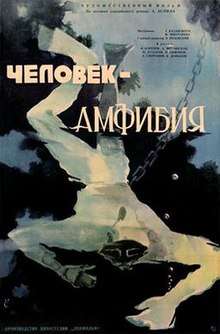Amphibian Man (film)
Amphibian Man (Russian: Человек-амфибия, translit. Chelovek-amfibiya) is a 1962 Soviet science fiction romance film starring Vladimir Korenev and directed by Vladimir Chebotaryov and Gennadi Kazansky. The film stars Vladimir Korenev and Anastasiya Vertinskaya in the lead roles.
| Amphibian Man | |
|---|---|
 Soviet poster for Amphibian Man | |
| Directed by | Vladimir Chebotaryov Gennadi Kazansky |
| Written by | Alexander Beliaev (novel) Akiba Golburt Aleksei Kapler Aleksandr Ksenofontov |
| Starring | Vladimir Korenev Anastasiya Vertinskaya Mikhail Kozakov |
| Music by | Andrei Petrov |
| Cinematography | Eduard Rozovsky |
Production company | |
| Distributed by | BijouFlix Releasing National Telefilm Associates (TV syndication) |
Release date | January 3, 1962 |
Running time | 82 min. |
| Country | Soviet Union |
| Language | Russian |
| Box office | 100 million admissions[1] |
It is an almost fable-like story based upon the eponymous 1928 novel by Alexander Beliaev. It focuses on a youth named Ichthyander (Russian: Ихтиандр, Ichtiandr) (from Greek: fish+man) who was surgically altered to survive under the sea. Unlike traditional science fiction movies of the time the film focuses much more on the concept of love won and lost. It was given the name of Tarzan des Mers before the estate of Edgar Rice Burroughs took exception.[2]
The film was the leader of Soviet distribution in 1962, with 65.5 million admissions during its initial run that year.[3] It later sold up to 100 million admissions including re-runs,[1] the highest for a Soviet film up until The Red Snowball Tree (1974).[4]
Plot
The story is set in a seaside port in Argentina (but filmed in Baku, Azerbaijan SSR[5]), largely among a community of pearl fishers. The protagonist is the adopted son of a doctor/scientist who was sometime in the past forced to save the boy's life by implanting him with shark gills. Thus he is able to live under water, but must keep his secret from the world. The conflict arises from his falling in love with a pearl-fisher's beautiful daughter. His secret is discovered and the girl's husband Pedro attempts to exploit Ichthyander for his ability to find pearls easily. Due to being kept caged under water, his ability to breathe in the open air is affected, and he must now live in the sea for several years. Although set free, the lovers are permanently separated from each other.
Although ostensibly a lost-love-tragedy like Romeo and Juliet, the film has a significant focus on greed and commercial exploitation (of the pearl-greedy fishermen), possibly under the influence of Socialist Realism.[6]
Cast
| Actor | Role |
|---|---|
| Vladimir Korenev | Ichthyander (voiced by Yuri Rodionov) |
| Anastasiya Vertinskaya | Guttiere (voiced by Nina Gulyaeva) |
| Mikhail Kozakov | Pedro Zurita |
| Anatoli Smiranin | Old Baltazar |
| Nikolay Simonov | Prof. Salvator |
| Vladlen Davydov | Olsen, the reporter |
| Sergei Boyarsky | Chief Prison Guard |
| Anatoli Ivanov | Ichthyander understudy in the most challenging underwater shots |
| Stanislav Chekan | prison guard |
| Nikolai Kuzmin | sailor |
| Mikhail Medvedev | boatswain |
| Yuri Medvedev | fishmonger |
| Anna Nikritina | Zurita’s mother |
| Tito Romalio Jr. | newsboy |
| Georgi Tusuzov | episode |
| Aleksandr Zakharov | policeman |
Home media
The Amphibian Man made its debut on DVD on August 21, 2001 where it was released by Image Entertainment. It was later re-released by VFN on July 9, 2015.[7]
Western world
Amphibian Man is little-known in the West, but has become a cult classic.[8][9] Hollywood filmmaker Quentin Tarantino cited Amphibian Man as one of his favourite Russian films, stating that he grew up watching an English dubbed version often shown on American television in the 1970s.[10]
There have been accusations that the 2017 Hollywood film, The Shape of Water, plagiarised Amphibian Man.[11][12][13][14] Indie Cinema Magazine noted that both have a similar plot, the use of the name "Amphibian Man" in both films, the Soviet connection in both stories, and the 1962 setting.[11]
References
- Wingrove, David. Science Fiction Film Source Book (Longman Group Limited, 1985)
Notes
- "How film flourished in the USSR". Humanities Division. University of Oxford. 6 December 2017. Retrieved 3 February 2019.
- Sydney Morning Herald "Movies" 25/9/2000 The Guide page 20 accessed via Ebbsco's Australia New Zealand Reference Centre
- Sergey Kudryavtsev (4 July 2006). "Отечественные фильмы в советском кинопрокате". Retrieved 11 December 2018.
- Interview with Boris Pavlenok, deputy director of the USSR GosKino
- Гизельдонское ущелье — Центральный Кавказ Archived 2016-03-04 at the Wayback Machine
- Новости NEWSru.com :: 45 лет назад на киноэкраны вышел «Человек-амфибия», собравший 60 млн зрителей
- "The Amphibian Man (1961) - Gennadiy Kazansky". AllMovie.com. Allmovie. Retrieved 10 September 2017.
- "Человек-амфибия". Archived from the original on 2012-06-04. Retrieved 2012-05-15.
- Шахназаров 2000.
- Berkhead, Samantha (8 August 2019). "Tarantino 'Shocked By Moscow' in First Visit to Russia Since 2004". The Moscow Times. Retrieved 28 August 2019.
- "The Shape of Water - Review: The Shape of Plagiarism of director Guillermo del Toro". Indie Cinema Magazine. 22 January 2018. Retrieved 28 August 2019.
- "Twitterati Say The Shape of Water Motif Goes Back to 1961 Iconic Soviet Movie". Sputnik News. 5 March 2018. Retrieved 28 August 2019.
- "Does a Movie Need to Have an Original Plot to Be Good?". Times of San Diego. 4 February 2018. Retrieved 28 August 2019.
- Islam, Kaji Enamul (6 April 2018). "How The Shape Of Water End Up Like A Good Movie Not A Great One". Medium. Retrieved 28 August 2019.